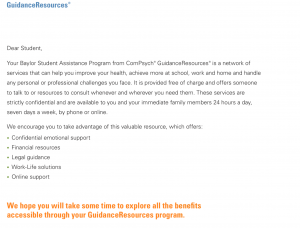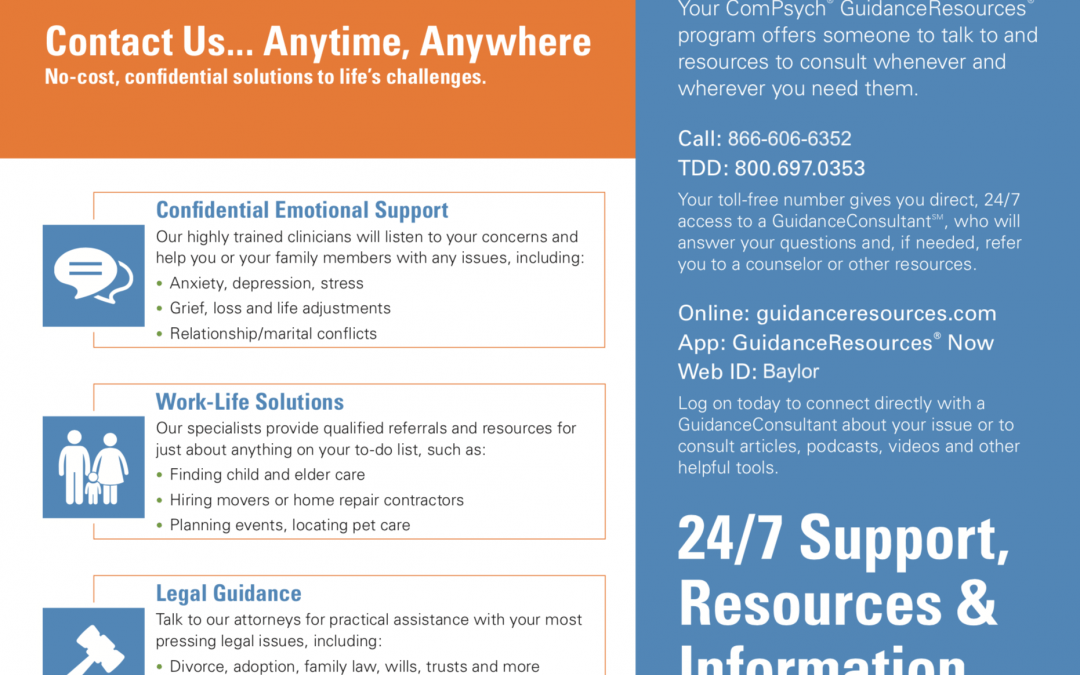Just this past Tuesday, the Chronicle of Higher Education ran a great story on Baylor, How Baylor Revamped Its Mental-Health Services Amid a Scandal. In case you missed it, it highlighted then STEM graduate student Jennifer Wagner. Wagner suffered from a serious eating disorder, and she credits the Counseling Center at Baylor with saving her life. “I don’t think I would be alive right now,” she frankly told the Chronicle, except for Baylor’s Eating Disorders Care and Assessment Team.
Mental Health is a serious issue for graduate students. We know that graduate students are SIX times more likely than the general population to suffer. Why? Because graduate students are under significant stress and experience very demanding work loads. I recently heard a presentation made by the graduate dean of Boston University on graduate students and overwork. He explained how research shows that working more than 50 hours a week is detrimental to physical health–placing students at higher risk for cardiovascular disease, at higher risk for getting involved in an accident, and at higher risk for mental and physical injuries. Because of the demands of academia and unrealistic expectations of some graduate faculty advisors, graduate students are at greater risk for overwork which contributes to their greater risk for depression and anxiety.
In short, when we think about the mental health crisis for graduate students, we have two big problems–both of which Baylor is working hard to address.
The first is caring better for graduate student mental health. As the Chronicle article pointed out so well, Jim Marsh–the Dean of Student Health and Wellness & Executive Director for Counseling Services– has already done a fantastic job in improving counseling services for Baylor students. As the article states, Baylor has an especially “comprehensive” counseling center when compared to other campuses. But, with our graduate student body growing, we need to do more.
I am so pleased to announce that Baylor has ALREADY done more to help care for our graduate students. Now, every graduate student at Baylor–online, part-time, full-time- residential, in-state, out-of-state, etc.–every graduate student at Baylor has access to ComPsych Guidance Resources.
 As the announcement states: “Your Baylor Student Assistance Program from ComPsych Guidance Resources is a network of services that can help you improve your health, achieve more at school, work and home and handle any personal or professional challenges you face. It is free of charge and offers someone to talk to or resources to consult whenever and wherever you need them. These services are strictly confidential and are available to you and your family members 24 hours a day, seven days a week, by phone or online.” The services it includes are: confidential emotional support, financial resources, legal guidance, work-life solutions, and online support.
As the announcement states: “Your Baylor Student Assistance Program from ComPsych Guidance Resources is a network of services that can help you improve your health, achieve more at school, work and home and handle any personal or professional challenges you face. It is free of charge and offers someone to talk to or resources to consult whenever and wherever you need them. These services are strictly confidential and are available to you and your family members 24 hours a day, seven days a week, by phone or online.” The services it includes are: confidential emotional support, financial resources, legal guidance, work-life solutions, and online support.
Simply Call 866-606-5352, or TDD 800-697-0353. Or go online to guidance resources.com and download the app Guidance Resources Now. The Web ID is Baylor.
It really is that simple. And it is here for you to use.
Of course, in order to better address the graduate student mental health crisis, we also need to address graduate student overwork. That is our second big problem, but we will save it for next time.

